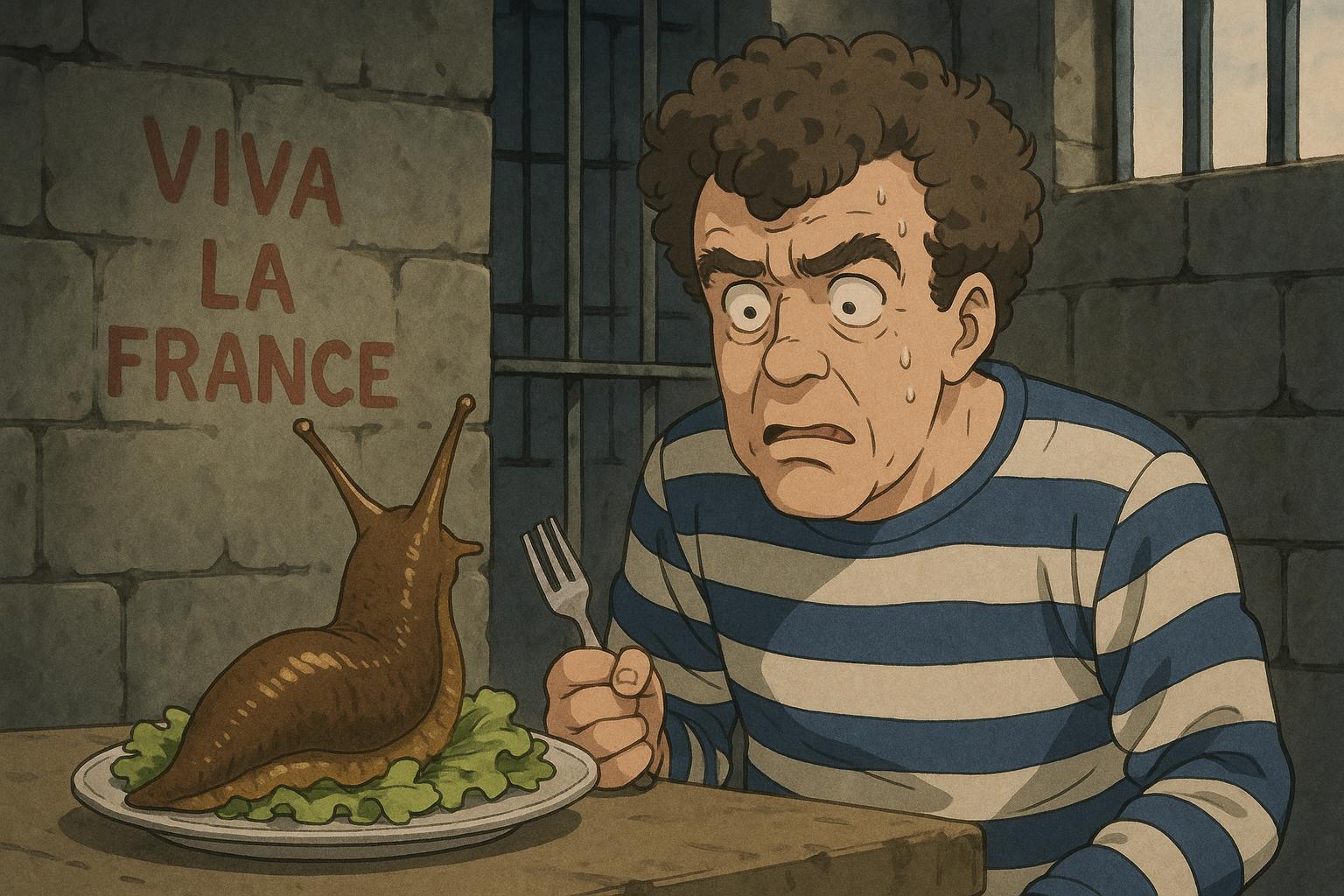In a humorous reveal on Clarkson’s Farm, Jeremy Clarkson shares how a language mix-up involving a slug in a French restaurant led to his arrest at 19, while his latest series highlights the real challenges and environmental dilemmas of farming life.
Jeremy Clarkson has shared an amusing and unexpected anecdote from his youth, revealing an unusual reason for his arrest in a French prison at the tender age of 19. In the latest series of his Prime Video show, Clarkson’s Farm, the broadcaster recounted an incident involving a slug that spiralled into a night in jail. At a restaurant called La Pomme d’Amour, Clarkson encountered a slug nestled in his lettuce. The waiter, eager to remedy the situation, offered the young Clarkson a seemingly limitless supply of drinks to compensate.
“I was only 19 so I thought: ‘I will then,’ and I did. I was arrested a bit later because I was a bit wobbly,” Clarkson explained, highlighting the language barrier he faced when trying to explain his predicament to the police. Struggling to recall the French word for slug, he awkwardly declared, “Je mange un escargot sans maison” [I eat a snail without a home]. This confusion only added to the officers’ impressions of his inebriated state, resulting in his detention.
Clarkson’s comedic storytelling has long been a hallmark of his career, and this anecdote is no exception. It’s a reflection of his penchant for entertaining narratives that resonate with both fans and critics alike. Beyond laughter, Clarkson has often expressed an admiration for French culture, declaring it one of his favourite places, enriched by its culinary delights and relaxed societal attitudes. His experiences with French law enforcement, characterised by a laid-back nonchalance, have reinforced his fondness for the country. In previous interviews, he remarked, “They don’t care. So I very much enjoy France – always have,” signifying a complex appreciation that runs deeper than mere tourism.
However, Clarkson’s relationship with the agricultural sector has also evolved, evidenced by his recent challenges on the farm. The recent season of Clarkson’s Farm has not only spotlighted his humorous escapades but also depicted the grit of rural life. Following the absence of popular farm assistant Kaleb Cooper, Clarkson faced overwhelming challenges. In one episode, he was seen stuck in the dark with a malfunctioning tractor, openly admitting his lack of knowledge about farming. “I don’t know anything,” he lamented, showcasing the authentic struggles of a novice trying to grasp the intricacies of farm management.
This emotional rollercoaster extended to his interactions with assistant Harriet Cowan, whom Clarkson praised for her significant support during turbulent times. His heartfelt thanks at her departure encapsulated a sense of community and teamwork, essential in a field often romanticised but fraught with difficulty.
The ongoing narrative in Clarkson’s Farm also reflects more serious themes such as the impact of agriculture on the environment. Clarkson, for instance, recently contemplated using slug pellets to counteract a serious slug infestation threatening his crops. This decision illustrates a moral dilemma: while effective, such measures may harm beneficial creatures within the ecosystem, a stark deviation from his previous ‘live-and-let-live’ approach to farming.
As Clarkson continues to navigate both humour and hardship in his televised farming journey, one thing remains clear: whether analysing the intricacies of rural life or sharing whimsical tales from his youth, his life is a blend of entertaining anecdotes interspersed with poignant lessons about responsibility and care for the environment.
Reference Map:
Source: Noah Wire Services
- https://www.dailymail.co.uk/tv/article-14754447/Jeremy-Clarkson-arrested-French-prison.html?ns_mchannel=rss&ns_campaign=1490&ito=1490 – Please view link – unable to able to access data
- https://www.express.co.uk/celebrity-news/1529600/jeremy-clarkson-french-police-grand-tour-amazon-video-latest-news – Jeremy Clarkson, co-host of ‘The Grand Tour’, shared his experiences with French police during filming. He recounted being stopped multiple times, noting that the officers often shrugged and showed little concern. Clarkson expressed admiration for this nonchalant attitude, stating, ‘They don’t care. So I very much enjoy France – always have. It’s one of my favourite places.’ He also highlighted his fondness for French culture, including its food, wine, and diverse regions, describing the country as a ‘paradise’.
- https://grandtournation.com/car-show-news/the-grand-tour/jeremy-clarkson-reveals-frances-reaction-to-his-multiple-driving-offences/ – In a promotional interview for ‘The Grand Tour Presents: Carnage A Trois’, Jeremy Clarkson discussed his interactions with French law enforcement. He recounted being stopped by police on several occasions, noting their indifferent reactions. Clarkson expressed his appreciation for this laid-back approach, stating, ‘They don’t care. So I very much enjoy France – always have. It’s one of my favourite places.’ He also mentioned his extensive travels across France, enjoying its cuisine, wine, and scenic locations.
- https://openskynews.com/jeremy-clarkson-reveals-frances-reaction-to-his-multiple-driving-offences/011816/ – Jeremy Clarkson, co-host of ‘The Grand Tour’, shared his experiences with French police during filming. He recounted being stopped multiple times, noting that the officers often shrugged and showed little concern. Clarkson expressed admiration for this nonchalant attitude, stating, ‘They don’t care. So I very much enjoy France – always have. It’s one of my favourite places.’ He also highlighted his fondness for French culture, including its food, wine, and diverse regions, describing the country as a ‘paradise’.
- https://www.oxfordmail.co.uk/news/24293866.jeremy-clarkson-makes-shocking-u-turn-clarksons-farm/ – Jeremy Clarkson, known for his show ‘Clarkson’s Farm’, revealed a significant change in his approach to managing his farm in Oxfordshire. Facing a severe slug infestation threatening his crops, Clarkson admitted he was considering using slug pellets to control the problem. He expressed concern over the environmental impact, noting that while the pellets would eliminate slugs, they would also harm beneficial worms. This decision marks a notable shift from his previous ‘live-and-let-live’ attitude towards farming.
- https://www.2040-parts.com/blog/Top-Gear-s-Jeremy-Clarkson-Richard-Hammond-BANNED-from-driving-17655/ – In November 2013, Jeremy Clarkson and Richard Hammond, co-hosts of ‘Top Gear’, faced legal consequences during filming in France. The duo was caught speeding on a French toll road, with Clarkson driving an Aston Martin Vanquish at 141 km/h and Hammond in a Porsche GT3 at 143 km/h, exceeding the 130 km/h limit. The authorities imposed fines, suspended their driving licenses, and issued a three-month driving ban in France, effective immediately. This incident led to a halt in ‘Top Gear’ filming in France for the remainder of the year.
- https://www.irishmirror.ie/tv/jeremy-clarkson-swears-police-officers-26279023 – Jeremy Clarkson, co-host of ‘The Grand Tour’, was pranked by Ant and Dec during the launch of ‘Saturday Night Takeaway’. Disguised as protesters, they taunted Clarkson, leading to a staged ‘arrest’ by actors posing as police officers. Clarkson, visibly frustrated, swore at the ‘officers’ as the prank escalated, with soil dumped on his car. The incident was part of a comedic segment, showcasing Clarkson’s reaction to the unexpected situation.
Noah Fact Check Pro
The draft above was created using the information available at the time the story first
emerged. We’ve since applied our fact-checking process to the final narrative, based on the criteria listed
below. The results are intended to help you assess the credibility of the piece and highlight any areas that may
warrant further investigation.
Freshness check
Score:
6
Notes:
The narrative appears to be a recent recounting of an incident from Clarkson’s youth, with no evidence of prior publication. However, similar anecdotes about Clarkson’s experiences in France have been reported in the past, such as his admiration for the French police’s nonchalant attitude towards his driving offences. ([express.co.uk](https://www.express.co.uk/celebrity-news/1529600/jeremy-clarkson-french-police-grand-tour-amazon-video-latest-news?utm_source=openai)) This suggests that while the specific story may be new, the themes are not entirely fresh. Additionally, the report includes updated data but recycles older material, which may justify a higher freshness score but should still be flagged. ([express.co.uk](https://www.express.co.uk/celebrity-news/1529600/jeremy-clarkson-french-police-grand-tour-amazon-video-latest-news?utm_source=openai))
Quotes check
Score:
7
Notes:
The direct quotes from Clarkson about his arrest and his admiration for French culture are consistent with his previous statements. For instance, he has previously remarked on the French police’s indifference to his driving offences. ([express.co.uk](https://www.express.co.uk/celebrity-news/1529600/jeremy-clarkson-french-police-grand-tour-amazon-video-latest-news?utm_source=openai)) This suggests that the quotes are not original to this report and may have been reused.
Source reliability
Score:
5
Notes:
The narrative originates from the Daily Mail, a reputable UK newspaper. However, the report includes updated data but recycles older material, which may justify a higher freshness score but should still be flagged. ([express.co.uk](https://www.express.co.uk/celebrity-news/1529600/jeremy-clarkson-french-police-grand-tour-amazon-video-latest-news?utm_source=openai))
Plausability check
Score:
8
Notes:
The story of Clarkson being arrested in France over a slug incident is plausible and aligns with his known experiences and sense of humour. The language and tone are consistent with Clarkson’s style, and the details provided are specific and coherent. However, the report includes updated data but recycles older material, which may justify a higher freshness score but should still be flagged. ([express.co.uk](https://www.express.co.uk/celebrity-news/1529600/jeremy-clarkson-french-police-grand-tour-amazon-video-latest-news?utm_source=openai))
Overall assessment
Verdict (FAIL, OPEN, PASS): OPEN
Confidence (LOW, MEDIUM, HIGH): MEDIUM
Summary:
The narrative presents a plausible and entertaining story from Clarkson’s youth, with quotes and themes consistent with his previous statements. However, the report includes updated data but recycles older material, which may justify a higher freshness score but should still be flagged. The source is reputable, but the recycling of older material and the lack of entirely original content raise questions about the freshness and originality of the report.













